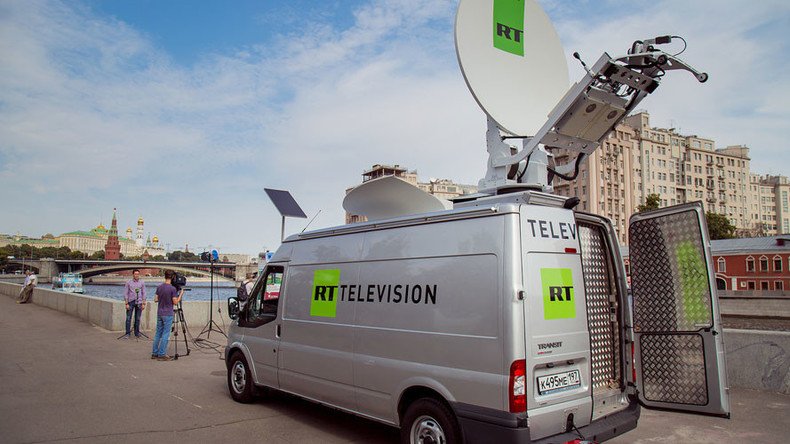UK move on RT 'part of EU policy of harassment against Russia-linked organizations'

The announcement that RT's UK bank accounts will be frozen is part of a coordinated EU policy aimed against Russian-linked organizations, John Laughland, Director of Studies at the Institute of Democracy and Cooperation in Paris, told RT.
Laughland noted that the British government took over the Royal Bank of Scotland Group in 2008, at the time of the financial crisis, and still owns approximately 75 percent of its shares. He believes Monday's disturbing announcement to be "politically inspired."
"My suspicion is that it's part of a coordinated and Europe-wide policy of harassment against organizations of that are associated with Russia," Laughland told RT from Paris. "We must understand this policy of harassment and hostility within the context of the decision taken about six months ago at a European Union summit, at which it was decided on the EU-level to combat 'Russian propaganda and disinformation,'" as it’s being called.
The EU has even established a special unit specifically designed to combat so-called "Russian disinformation and, particularly RT, which more than any other news outlet has irritated people in the West because it has a very muscular editorial policy,” he explained.
Laughland reiterated the "real political motives" behind this latest move, mentioning Boris Johnson, the new [UK] Foreign Secretary, who told a recent Tory Party conference that, although Britain was leaving the EU, it "wouldn’t abandon being in the forefront of sanctions against Russia."
Laughland said Johnson implied that "Britain would increase its call for sanctions against Russia while in the process of leaving the EU."
Meanwhile, George Galloway, British politician and host of RT’s ‘Sputnik,' said the announcement by the Bank of Scotland "is shocking but not surprising."
"It comes at a time when it has been obvious in parliament and in the deep state that there is a state of anxiety about the growing influence and popularity of RT in the country”, he said.
According to Galloway, part of the explanation comes from the fact that the BBC is losing influence and credibility.
The announcement to freeze RT's accounts "coincides with a simultaneous fall in credibility of the British state broadcaster, the BBC (...), he said.
"Fewer and fewer people are watching [the BBC] and less and less (...) are paying very much attention to what it says. It is just crude British state propaganda.
"They have been nervous about RT for some time,” he added.
Galloway expressed no doubt as to who was behind the decision.
“This bank is owned by the British government. This is a decision taken by the British government. It flows from the discussions of the last few weeks about intensifying sanctions against Russia and Syria."
But the charismatic British politician was optimistic that not much would come of this latest move against RT.
"The good news is, this is the 16th year of the 21st century, and no one - and certainly not Boris Johnson - can stop the British people getting access to RT, and they will in increasing numbers."
The British establishment does not “particularly like differences in opinion,” David Coburn, a member of the European Parliament from the UK Independence Party (UKIP), told RT, commenting on NatWest Bank’s decision to close RT’s accounts, which he called “ridiculous.”
The politician stressed that RT “adds” to the “diversity in the media” and “gives a different perspective,” adding that it would be wrong to stop allowing people to express different points of view. He also said that, after leaving the EU, the UK should build relationships with Russia, particularly in terms of business.
"All RT is doing is asking… questions. We want to hear other people’s points of view. And it is wrong to stop that. One has to ask questions, what is the meaning of this?" Coburn told RT.
Meanwhile, John Pilger, an author and documentary filmmaker, told RT that political interference is “the only explanation” of NatWest’s decision. The bank is being “used and really abused by the British government, acting on behalf of Washington,” Pilger told RT.
He added that this move is also a “signal,” indicating that the British establishment “will not tolerate any dissent.” He also dismissed accusations concerning RT’s affiliation with the Russian government. “If RT is Kremlin-backed, then how do you describe the BBC?” the author said, adding that the BBC was condemned in 2003 “for presenting Blair government news.”
He also said that RT “is presenting an alternative view, and you are meant to have an alternative view in free societies.”
“The kind of censorship we have in the west now becomes [almost] equal to” that of the Soviet Union in times of the Cold War, Pilger told RT, adding that it is “intolerable.”
He also complained that modern British media became “unwatchable” and the UK’s “media society is dominated by [Rupert] Murdoch’s [News Corporation] view and the BBC-[promoted] state view,” adding that there are only few exceptions and almost “no real investigative journalism.”
“It is a disgrace for a country with fine and rich tradition of free journalism,” Pilger said, calling on all “real journalists” to “wake up” and “speak now.”
The statements, views and opinions expressed in this column are solely those of the author and do not necessarily represent those of RT.












